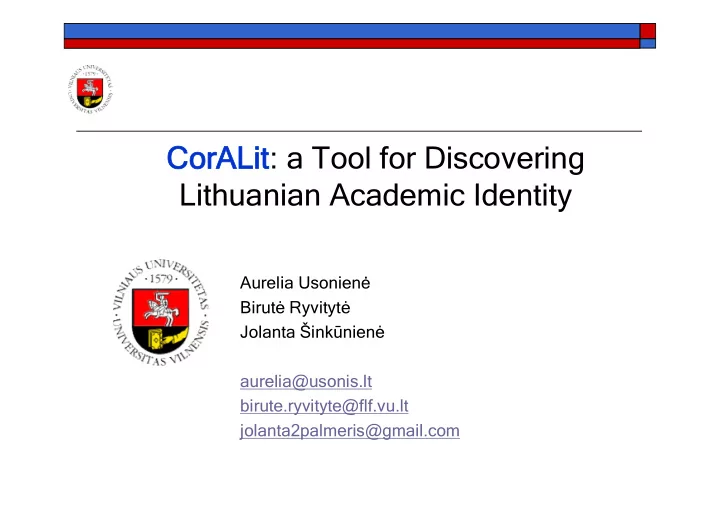

CorALit : a Tool for Discovering Lithuanian Academic Identity Aurelia Usonien ė Birutė Ryvitytė Jolanta Šinkūnienė aurelia@usonis.lt birute.ryvityte@flf.vu.lt jolanta2palmeris@gmail.com
Background (Gotti 2007) Globalisation & extensive scientific collaboration promotes spread of E as lingua franca in international communication possible transfer of Anglocentric textual models move towards global communicative models ? Hybrid identity of academic discourse
TOOL CADIS - Corpus of Academic English (2005) to analyse the most significant macro- microlinguistic variants in terms of identity, evaluation and interpretation speech acts expressing positive/negative evaluation; the pragmatic, interpersonal plane of discourse (stance, hedging, politeness); the function of verbal and lexical modality;
KIAP project (Norway 2002 – 2006) Cultural Identities and Academic Voices (Fløttum e.a. 2007) Corpus-based analysis (3 million words) E vs. F vs. NO Disciplines economics – linguistics - medicine Features analysed Markers of epistemic modality
CorALit: purpose Cor pus of A cademic Lit huanian to be used for linguistic research of academic discourse to facilitate understanding of identity-forming features to reveal presence/absence of signs of (cultural) resistance to ‘hybridisation’ to explore the impact of E as lingua franca on the identity of academic LT
Corpus design and structure funded by the Lithuanian State Science and Studies Foundation (2007-2009) Specialised biomedical, humanities, social, physical, technological sciences Comparable (across disciplines) Encoded (TEI 5P guidelines) Written texts Synchronic
Size and structure Science areas No of texts No of words B 281 670 397 H 449 2 114 543 P 70 430 806 S 344 1 459 098 T 81 547 030 TOTAL: 1 225 5 221 874
Structure: Text types Text type No of texts No of words reviews, 144 130 571 summaries, abstracts, etc. 990 3 167 834 articles 84 1 868 074 books
Lexical saturation
Academic discourse “involves a complex cognitive and linguistic activity whereby writers construct ideal texts with particular reading audiences in mind, and seek, in realising those ideal texts, to design their discursive structures and to realise their lexico-grammatical textualisations to match the conventions of the genres within which they are writing and the <...> expectancies and competencies of the readership they have in mind.” (Hyland 2000:xv)
Author’s presence in academic LT ATTITUDE Epistemic qualification Probability Source of info/knowledge Evaluation Subjectivity
Realizations of Ep in LT Epistemic adverbials in LT Modal words ( gal, galbūt, turbūt ) Particles ( bemaž, kažin, gal, turbūt) Adverbs ( mažne , tikriausiai )
Frequency lists Grumadienė and Žilinskienė 1997; a lemmatised frequency list of the 1, 2M- word corpus of written Lithuanian Andrius Utka frequency list 60M-word Corpus of Contemporary Lithuanian Language ( CCLL : http://donelaitis.vdu.lt/)
Top frequency Particle gal (‘perhaps/maybe/whether’) 99th CCLL: gal 92; galbūt (‘maybe’) 388 turbūt (‘probably’) 758
Academic vs. News (f/1000) News LT Epistemic Adverbials Academic LT CorALit CCLL 0.71 GAL (‘perhaps’) 0.11 0.20 GALBŪT (‘maybe’) 0.12 0.05 0.11 TURBŪT (‘probably’) 0.10 AKIVAIZDU ( ‘ evidently ’ ) 0.04 0.03 REGIS (‘apparently’) 0.05
LT: Academic vs. News (f/1000) Academic CorALit News CCLL 0,8 0,7 0,6 0,5 0,4 0,3 0,2 0,1 0 gal galbūt turbūt akivaizdu regis
GAL (‘perhaps’) in CorALit LT: Tokia klasifikacija gal ir nėra labai tiksli, tačiau šių šalių valdymo bruožai skiriasi (S) E: ‘‘ Perhaps this classification is not very exact, but the features of management of those countries are different’ (S)
AKIVAIZDU (‘evidently’) in CorALit LT: Šiuolaikinės istoriografijos istorijos kritinis potencialas, akivaizdu, nėra suprantamas kaip istorikų rūšiavimas į „baltuosius“ ir „juoduosius“. (H) E: ‘The critical potential of contemporary historiographical history is evidently not understood as sorting historians into “white” and “black”.’ (H)
REGIS (‘apparently’) in CorALit LT: Tokia meno tradicijos samprata estetui, regis , buvo priimtiniausia . (H) E: ‘Such a concept of art tradition apparently was the most acceptable for the aesthete.’ (H)
BNC: Academic vs. News (f/1000) 0,35 Academic BNC 0,3 News BNC 0,25 0,2 0,15 0,1 0,05 0 perhaps maybe probably evidently apparently
Academic LT: across science areas 0,18 H 0,16 S 0,14 0,12 P 0,1 B 0,08 T 0,06 0,04 0,02 0 gal galbūt turbūt akivaizdu regis
Specialized vocabulary (f/1000) CorALit vs. CCLL sistem in (is/ė) 0.10 0.01 sistem išk (as/a) 0.01 0.00(260) sistem ing (as/a) 0.03 0.01 sistema tin (is/ė) 0.00(9) 0.00 (43) sistema ting (as/a) 0 0.00 (9) sistema tišk (as/a) 0.00(1) 0.00 (21)
Across science areas (CorALit) (f/1000) ADJ + ADV B H S P T 0.14 0.04 0.09 0.35 0.07 sistem in (is/ė) sistem išk (as/a) 0.01 0.01 0.02 0.00 0.00 0.02 0.03 0.05 0.02 0.01 sistem ing (as/a) sistema tin (is/ė) 0 0.00 0.01 0.01 0 0 0 0 0 0 sistema ting (as/a) sistema tišk (as/a) 0 0.00 0 0 0
Term Bank: LT sisteminė analizė, rinkmena sistemingasis nuokrypis sistemingoji paklaida, atranka (http://terminai.vlkk.lt:10001/pls/tb/tb.search)
BNC academic (f/1000) systemic 0.01 systematic 0.04 systematical 0
Specialized vocabulary (f/1000) CorALit CCLL problemin(is/ė) 0.04 0.01 problemišk(as/a) 0.02 0.01 problematin(is/ė) 0.00 0.00 problematišk(as/a) 0.00 0.00
BNC academic (f/1000) problematic 0.03 problematical 0.00
Concluding observations # Academic discourse is neutral and objective Author’s presence Internationalisation of specialised terminology
Recommend
More recommend